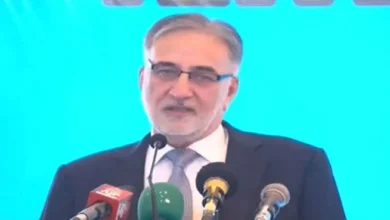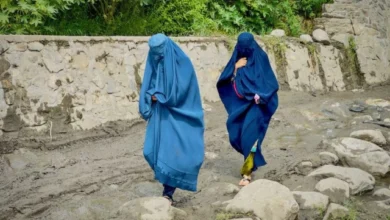Imran appears via video link as SC resumes hearing NAB laws case

The Supreme Court has resumed hearing a case about changes in the accountability laws as former prime minister Imran Khan appeared before it via video link as a petitioner in the matter.
The anticipated development comes after the Supreme Court on Tuesday, hearing the case about the National Accountability Bureau (NAB) laws, had ordered the federal and Punjab governments to facilitate Imran’s appearance on Thursday via video link from Adiala jail.
Justice Athar Minallah — part of the five-member bench hearing the case — had stated that the top court could not deny an audience to the ex-premier if he wished to appear before it for the case.
Today, the bench — headed by Chief Justice of Pakistan (CJP) Qazi Faez Isa and also including Justices Aminuddin Khan, Jamal Khan Mandokhail, Athar Minallah and Hasan Azhar Rizvi — resumed hearing the case.
The hearing is not being live-streamed, unlike the last one which was.
In jail in multiple cases, this will be Imran’s first public appearance since his arrest from Zaman Park in August last year in the Toshakhana case despite reservations expressed by Law Minister Azam Nazeer Tarar about the SC’s directives.
A day ago, a division bench of the Islamabad High Court granted the former premier bail in the £190 million case on “reasonable ground” while an Islamabad session court acquitted him in a 2022 case in connection with the Azadi March.
However, the PTI has expressed apprehensions about a visitors’ ban in the Adiala jail, saying the move was implemented to keep the party chief away from the SC proceedings.
Speaking at a press conference, PTI spokesperson Raoof Hasan had claimed that over the past two days, Imran’s security guards were suddenly changed at midnight and the hearings in the Al-Qadir Trust, cipher, and Toshakhana cases were postponed under various excuses, while the government’s counsel in the Iddat case suddenly left the country.
The NAB laws case
In 2022, amendments were made to the country’s accountability laws by the then-Pakistan Democratic Movement-led government.
The amendments made several changes to the National Accountability Ordinance (NAO) 1999, including reducing the term of the NAB chairman and prosecutor general to three years, limiting NAB’s jurisdiction to cases involving over Rs500 million, and transferring all pending inquiries, investigations, and trials to the relevant authorities.
Subsequently, Imran had moved the apex court against the amendments, claiming that the changes to the NAB law were made to benefit the influential accused persons and legitimise corruption.
The petition had pleaded that the fresh amendments tend to scrap corruption cases against the president, prime minister, chief ministers and ministers and provide an opportunity to the convicted public office-holders to get their convictions undone.
In September last year, after 53 hearings, the SC announced its 2-1 verdict, ordering the restoration of corruption cases against public office holders that were withdrawn due to the amendments and declaring Imran’s plea to be maintainable.
The next month, a five-judge SC bench took up intra-court appeals (ICAs) against its Sept 15 judgment and stopped accountability courts from issuing a final verdict in graft cases.
In a subsequent hearing, CJP Isa had hinted that the proceedings could be started afresh if the counsel managed to “make a solid case” for the same, as earlier proceedings did not satisfy the requirements of the Supreme Court (Practice and Procedure) Act 2023.
It then resumed hearing the ICAs on Tuesday, ordering authorities to ensure Imran’s presence before the apex court via video link as he was a petitioner in the case.
The apex court was seized with a number of ICAs moved by the federal government as well as by a private citizen Zuhair Ahmed Siddiqui, who was an accused in a corruption case but not a party to the challenges to the NAB amendments case.



